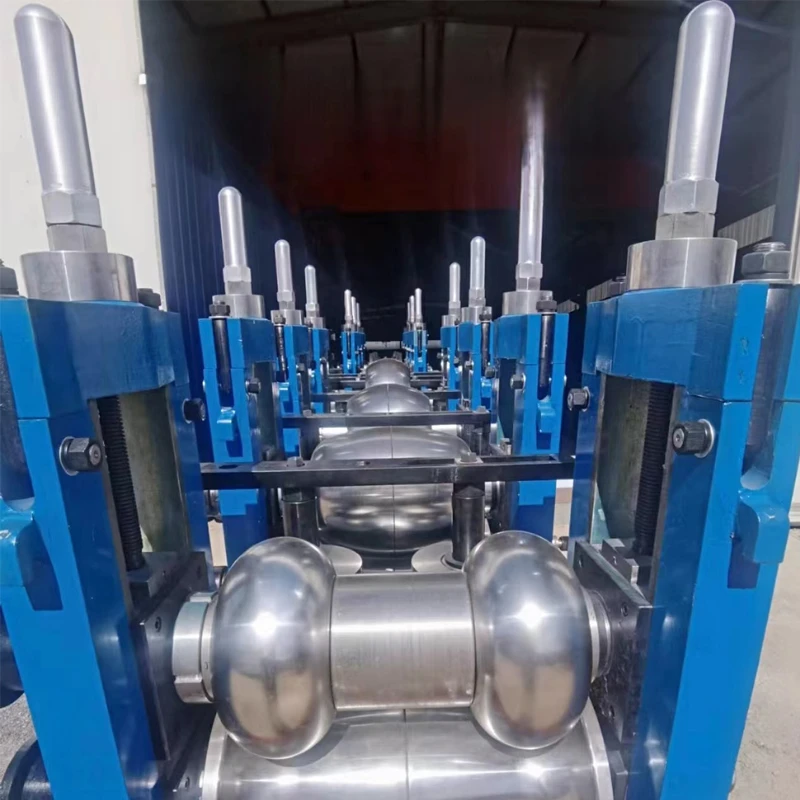pipe manufacturing machine
Understanding Pipe Manufacturing Machines An Overview
In the modern manufacturing landscape, the production of pipes has become a crucial industry due to the increasing demand for various applications ranging from construction to plumbing and industrial processes. Central to this industry is the technology known as pipe manufacturing machines. These machines embody a range of processes designed to create high-quality pipes efficiently and effectively.
Types of Pipe Manufacturing Machines
There are several types of pipe manufacturing machines, each tailored for specific materials and production methods. The most common types include
1. Extrusion Machines These machines are primarily used for manufacturing plastic pipes. The process involves melting raw plastic pellets and forcing the molten material through a die to form a continuous pipe. This method is widely used for producing PVC, HDPE, and other plastic pipes that are lightweight and resistant to corrosion.
2. Welding Machines For metallic pipes, welding machines play a crucial role. They are used to join sections of pipe together, ensuring strength and durability. Various welding techniques can be employed, such as TIG (Tungsten Inert Gas) and MIG (Metal Inert Gas), depending on the material and application.
3. Cold Drawing Machines In the case of metal pipes, particularly those made from stainless steel or aluminum, cold drawing machines are used. This process involves pulling the material through a die to reduce its diameter and increase its length, producing pipes with enhanced mechanical properties.
4. Spiral Pipe Machines These machines are specialized for manufacturing spiral pipes, which are often used in large-scale applications. The process involves coiling a flat steel strip into a circular shape and welding the edges together to create a strong, durable pipe.
The Manufacturing Process
The process of pipe manufacturing varies significantly depending on the material used and the desired end product. However, there are some general stages that most manufacturing processes share
pipe manufacturing machine

1. Material Preparation The first step involves preparing the raw materials, whether they are plastic pellets, metal coils, or other forms. This stage may include drying, melting, or shaping the materials.
2. Shaping This stage is where the core functionality of the pipe manufacturing machine comes into play. Depending on the machine type, materials are extruded, welded, or drawn into the desired pipe shape.
3. Cooling and Hardening After shaping, pipes usually undergo a cooling process to solidify and harden the material. In the case of plastic pipes, this might involve passing the extruded pipe through a cooling bath, while metal pipes may be cooled in air or water.
4. Quality Control Quality assurance is critical in pipe manufacturing. Machines are often equipped with automated systems to conduct tests for diameter, thickness, and strength. Non-destructive testing methods may also be employed to ensure there are no hidden defects in the pipes.
5. Cutting and Finishing Once the pipes are manufactured and tested, they are cut to length and may undergo additional finishing processes, such as surface treatment, to enhance their durability and performance.
Technological Advancements
The pipe manufacturing industry has witnessed significant technological advancements in recent years. Automated and computer-controlled machines now streamline operations, improving production rates and reducing waste. Additionally, advancements in materials science have led to the development of stronger, lighter, and more durable pipe materials. Smart manufacturing technologies, including IoT sensors and data analytics, are now being integrated into manufacturing processes, enabling real-time monitoring and predictive maintenance of machines.
Conclusion
Pipe manufacturing machines are an indispensable part of modern manufacturing, playing a vital role in the production of pipes that support countless industries and infrastructure projects. As technological innovations continue to reshape the landscape of pipe manufacturing, the efficiency, quality, and sustainability of pipe production will only improve. Understanding the types of machines and the processes involved is crucial for manufacturers aiming to stay competitive in a rapidly evolving marketplace. The future of pipe production not only promises enhanced performance and reduced costs but also a focus on environmentally friendly practices, further driving the growth of this essential industry.
-
High Frequency Straight Seam Welded Pipe Production Line-BzZhou Xinghua Machinery Equipment Manufacturing Co., LTD.|line pipe steel&welded gas pipeNewsJul.30,2025
-
High Frequency Straight Seam Welded Pipe Production Line-BzZhou Xinghua Machinery Equipment Manufacturing Co., LTD.|High Precision&Automated SolutionsNewsJul.30,2025
-
High Frequency Straight Seam Welded Pipe Production Line - BzZhou Xinghua Machinery Equipment Manufacturing Co., Ltd.NewsJul.30,2025
-
High Frequency Straight Seam Welded Pipe Production Line-BzZhou Xinghua Machinery Equipment Manufacturing Co., LTD.|Precision Welding, High EfficiencyNewsJul.30,2025
-
High Frequency Straight Seam Welded Pipe Production Line|BzZhou Xinghua|Precision Welding&EfficiencyNewsJul.30,2025
-
High Frequency Straight Seam Welded Pipe Production Line - BzZhou Xinghua|Precision Engineering&EfficiencyNewsJul.30,2025


